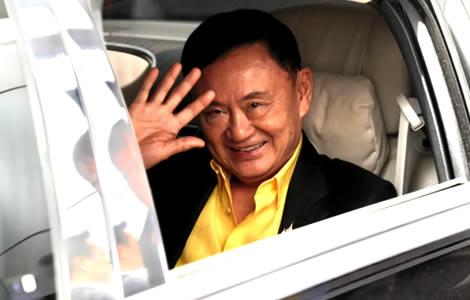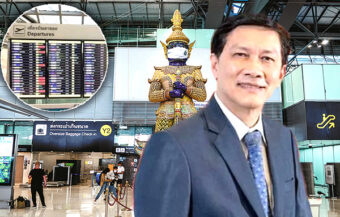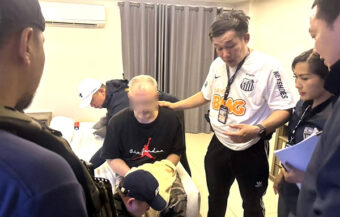All eyes will be on Thaksin Shinawatra in Bangkok this Friday as he faces a lèse-majesté verdict, risking another prison sentence in a trial that could upend Thailand’s politics, challenge the Pheu Thai party and impact his family’s national influence.
All eyes will be on Thailand’s Criminal Court in central Bangkok this Friday as former Prime Minister Thaksin Shinawatra faces a high-stakes appearance. The lèse-majesté case, rooted in the junta era, was nonetheless pursued by the Office of the Attorney-General (OAG) even after Thaksin’s dramatic return in August 2023. He now confronts charges of lèse-majesté and violations of the 2007 Computer Crime Act, tied to a 2015 interview with a South Korean newspaper. The verdict could either send shockwaves through Thai politics or be one less problem for the country’s de facto political leader.

Thailand’s Criminal Court will hand down its verdict on Friday in a landmark case against former Prime Minister Thaksin Shinawatra. Notably, the ruling, set for 10:00 a.m. on August 22, will determine whether Thaksin is guilty of lèse-majesté and related cybercrime offences.
The charges stem from a 2015 interview Thaksin gave to the South Korean newspaper Chosun Ilbo. In that interview, prosecutors allege he made remarks deemed insulting to the monarchy. As a result, he now faces prosecution under Section 112 of the Criminal Code and the 2007 Computer Crime Act.
Significantly, this high-profile case comes exactly two years after Thaksin returned to Thailand from 15 years of self-imposed exile. The verdict will be delivered amid rising political tension and growing concerns about democratic backsliding in Thailand.
Thaksin is recognised as central figure behind Pheu Thai party and his daughter, Prime Minister Paetongtarn
Thaksin Shinawatra, a former Prime Minister, is at this time recognised as the key figure behind the Pheu Thai Party and his daughter, Prime Minister Paetongtarn Shinawatra. Indeed, he can be described as the country’s political leader.
Although Thaksin and his legal team remain confident, the stakes are immense. If convicted, a guilty verdict could trigger a political earthquake. Moreover, it would deepen existing divisions between the country’s conservative establishment and grassroots support that still backs Thaksin.
Tomorrow’s court session will be held behind closed doors. The Criminal Court has issued strict restrictions. Media must remain in designated areas and may not enter the courtroom. Photographs are only allowed in specified zones and all journalists must wear temporary press credentials.
Moreover, unrelated individuals will be banned from the courtroom. These measures mirror those in place during the earlier witness hearings, all of which were conducted in secret.
Thaksin faces lèse-majesté and computer crime charges originating from 2014 coup and NCPO military orders
Thaksin is accused of defaming, insulting or expressing malice toward the monarchy. Furthermore, he is also charged with importing illegal content into a computer system. These are serious national security offences.
Notably, the origins of this case trace back to Thailand’s 2014 military coup. The ruling junta, the National Council for Peace and Order (NCPO), ordered the case to proceed. General Udomdej Sitabutr, the NCPO’s then-Secretary-General, directed the Department of Justice to file a formal complaint.
Following this, the Technology Crime Suppression Division (TCSD) launched an investigation. Because the interview occurred outside Thailand, the case fell under the Attorney General’s jurisdiction.
On September 19, 2016, Attorney General Pongniwat Yutthaphanborihan ruled in favour of indicting Thaksin. However, Thaksin was then living abroad, and the case stalled. Authorities obtained an arrest warrant, but there was no way to enforce it until his return.
Thaksin returned to Thailand in 2023 and was immediately confronted with this lèse-majesté charge
Under what is thought to have been a deal with conservative power brokers, on August 22, 2023, Thaksin returned to Thailand. Immediately upon arrival at Don Mueang Airport, he was taken into custody on existing charges before the courts. At that moment, the pending lèse-majesté case was also presented to him.
After that, Thaksin’s lawyers claimed the case was a misunderstanding and tried to have it quashed. However, this effort failed.
In January 2024, Attorney General Amnat Jetjaroenrak formally presented the charges to Thaksin at the Police General Hospital. Thaksin denied all allegations. In addition, he submitted a petition requesting further investigation.
Consequently, prosecutors reviewed the evidence once more. Ultimately, Amnat confirmed the decision to indict Thaksin. The charges include violations of Section 112, Section 83 of the Criminal Code and the 2007 Computer Crime Act.
Importantly, the court later allowed Thaksin to postpone the indictment hearing. His lawyers submitted a medical certificate citing COVID-related illness. The court rescheduled the hearing for June 18, 2024.
Thaksin granted conditional bail and the trial moved quickly with secret hearings and limited observers
On that day, the court granted Thaksin conditional bail. The amount was set at ฿500,000. Furthermore, he was ordered not to leave the country without court permission.
The trial has since moved quickly. From July 1–3, the prosecution presented its witnesses. The defence presented its case on July 16. Each session was conducted in camera, with no observers allowed.
Defence witnesses included Thaksin himself, legal scholar Thongthong Chandrangsu and former Deputy Prime Minister Wissanu Krea-ngam. The court allowed only one day for defence testimony and Thaksin’s team declared they had no more witnesses to call.
The court then scheduled the verdict for August 22. Certainly, the timing is symbolically significant. It not only marks two years since Thaksin returned, but also serves as a flashpoint for his political future.
Meanwhile, tensions rose further on Thursday when Thaksin’s daughter, Prime Minister Paetongtarn Shinawatra, testified before the Constitutional Court. She appeared in a separate case concerning her qualifications for office. Additionally, National Security Council Secretary-General Chatchai Bangchuad testified alongside her.
Praise for Paetongtarn’s poised performance while court expected to rule strictly under the constitution
Observers noted her poised performance. However, legal analysts argued her testimony lacked alignment with core legal principles. Afterwards, reports indicated her appearance was, at times, emotional and passionate.
Nevertheless, the Constitutional Court is expected to base its ruling strictly on legal provisions set forth in the 2017 Constitution. That ruling is expected next Friday, August 29th at 3 pm.
Back at the Criminal Court, crowds of Red Shirt supporters are expected to gather. They previously attended all of Thaksin’s court dates in large numbers. Authorities are preparing for demonstrations and potential disruptions around Ratchadaphisek Road.
Protest is not the only concern. Political analysts warn that a guilty verdict may reignite deep divides in Thai society. Indeed, many fear it could destabilise the government led by Thaksin’s Pheu Thai party.
The case strikes at the heart of Thailand’s political order. Section 112 has long been a flashpoint. However, critics argue it has been used to silence dissent. Supporters insist it is necessary to protect the monarchy.
International observers and human rights groups warn such trials weaken Thailand’s democratic institutions
International observers are also watching closely. Human rights groups have expressed concern over the opacity of the proceedings.
Meanwhile, government spokespeople have insisted the case is proceeding according to the law. They emphasise the independence of the judiciary and the rule of law.
Still, critics point out that the timing of the case is politically charged. Some allege that reviving the 2015 case upon Thaksin’s return was a strategic move. It may have been aimed at curbing his influence just as his daughter rose to power.
As of now, Thaksin remains a polarising figure. Loved by millions, hated by the establishment, he remains at the centre of Thai politics—even from the courtroom.
Thaksin could face up to 15 years in prison with additional penalties under the 2007 Computer Crime Act
If found guilty, Thaksin faces a potential prison sentence of up to 15 years. Moreover, additional penalties under the Computer Crime Act could increase that total. His legal team is expected to appeal any adverse ruling immediately.
For now, the nation waits. The outcome of tomorrow’s verdict could, if it goes against Mr. Thaksin, send political instability signals skyrocketing. Even if he is acquitted, it is only what is expected. Regardless, its implications will be felt far beyond the courtroom.
Prime Minister Paetongtarn Shinawatra a no-show at cabinet and an appointment with Pheu Thai MPs
Ex-PM Thaksin’s lèse-majesté trial hearings close in Bangkok. Court sets August 22nd as Judgement Day
Tomorrow’s session will begin at 10:00 a.m. sharp. No outsiders will be allowed inside. However, all eyes will be on the Criminal Court as it delivers its decision in yet another politically sensitive case linked with the country’s most powerful political family.
Join the Thai News forum, follow Thai Examiner on Facebook here
Receive all our stories as they come out on Telegram here
Follow Thai Examiner here
Further reading:
Prime Minister Paetongtarn Shinawatra a no-show at cabinet and an appointment with Pheu Thai MPs
Senate Committee Chair tells government to send Trump’s men packing and accept the 36% tariff rate


















